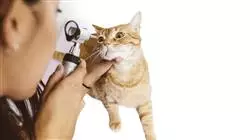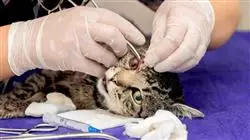University certificate
The world's largest faculty of veterinary medicine”
Introduction to the Program
In this Master's Degree, the main pathologies that can appear in the animal eye are studied, as are the most appropriate methods of diagnosis, treatment and approach in each case"

Veterinary ophthalmology has advanced at a rapid pace in recent decades, which has allowed specialists to solve or mitigate ocular problems that negatively affect the quality of life of animals.
The Master's Degree in Veterinary Ophthalmology in Small Animals includes all the advances made in the study of ophthalmologic diseases and their treatment. It compiles and develops these aspects to provide veterinary professionals with a clear, in depth and up to date overview of Veterinary Ophthalmology in Small Animals, and thereby allows them to apply the knowledge acquired.
The topics presented in this Master's Degree have been selected with the aim of offering comprehensive, specialized and advanced studies in Ophthalmology that will allow veterinary professionals to develop in depth knowledge with which to address ocular disorders in small animals, in this case, those in dogs and cats.
Although the main subject of this Master's Degree is Ophthalmology as applied to dogs and cats, given that they are the species most commonly found in the veterinary clinic, Veterinary Ophthalmology in Exotic Animals also occupies an important place in the specialization.
Finally, pathological and non-pathological alterations will also be studied, with special focus on the most appropriate medical and surgical treatments according to each case. This will provide students with general knowledge on the specialty, which will in turn allow them to practice with greater success in their daily practice.
One of the problems affecting continued education is the difficulty professionals find in conciliating studies with work and personal routines. Current professional demands make it difficult to provide quality, specialized, face to face education, which is why our online format allows students to combine this updating program with their daily professional practice.
In depth study and specialization in ophthalmological conditions, as well as the possibility to learn and improve specific and advanced diagnostic protocols, will allow students to establish the most appropriate medical and/or surgical treatment for each case"
This Master's Degree in Veterinary Ophthalmology in Small Animals contains the most complete and up to date scientific program scientific the market. Its most important features include:
- Case studies presented and developed by experts in Veterinary Ophthalmology
- Graphic, schematic, and practical contents created to provide scientific and practical information on the disciplines that are essential for professional practice
- Practical exercises where self assessment can be used to improve learning
- Its special emphasis on innovative methodologies
- Theoretical lessons, questions to the expert, debate forums on controversial topics, and individual reflection assignments
- Content that is accessible from any fixed or portable device with an Internet connection
Thanks to this comprehensive educational program, you will be able to provide a differential approach to ocular pathologies in small animals"
The program’s teaching staff includes professionals from the sector who contribute their work experience to this training program, as well as renowned specialists from leading societies and prestigious universities.
The multimedia content, developed with the latest educational technology, will provide the professional with situated and contextual learning, i.e., a simulated environment that will provide immersion training programmed to train in real situations.
This program is designed around Problem Based Learning, whereby the professional must try to solve the different professional practice situations that arise throughout the program. For this purpose, the student will be assisted by an innovative interactive video system created by renowned and experienced experts.
As a differentiating aspect, this Master's Degree is not only focused on ocular pathologies of dogs and cats, but also addresses those of exotic animals"

Anatomical knowledge is essential for the correct interpretation of pathologies. This Master's Degree brings you all this knowledge from a unique and highly effective perspective"
Why study at TECH?
TECH is the world’s largest online university. With an impressive catalog of more than 14,000 university programs available in 11 languages, it is positioned as a leader in employability, with a 99% job placement rate. In addition, it relies on an enormous faculty of more than 6,000 professors of the highest international renown.

Study at the world's largest online university and guarantee your professional success. The future starts at TECH”
The world’s best online university according to FORBES
The prestigious Forbes magazine, specialized in business and finance, has highlighted TECH as “the world's best online university” This is what they have recently stated in an article in their digital edition in which they echo the success story of this institution, “thanks to the academic offer it provides, the selection of its teaching staff, and an innovative learning method aimed at educating the professionals of the future”
A revolutionary study method, a cutting-edge faculty and a practical focus: the key to TECH's success.
The most complete study plans on the university scene
TECH offers the most complete study plans on the university scene, with syllabuses that cover fundamental concepts and, at the same time, the main scientific advances in their specific scientific areas. In addition, these programs are continuously being updated to guarantee students the academic vanguard and the most in-demand professional skills. In this way, the university's qualifications provide its graduates with a significant advantage to propel their careers to success.
TECH offers the most comprehensive and intensive study plans on the current university scene.
A world-class teaching staff
TECH's teaching staff is made up of more than 6,000 professors with the highest international recognition. Professors, researchers and top executives of multinational companies, including Isaiah Covington, performance coach of the Boston Celtics; Magda Romanska, principal investigator at Harvard MetaLAB; Ignacio Wistumba, chairman of the department of translational molecular pathology at MD Anderson Cancer Center; and D.W. Pine, creative director of TIME magazine, among others.
Internationally renowned experts, specialized in different branches of Health, Technology, Communication and Business, form part of the TECH faculty.
A unique learning method
TECH is the first university to use Relearning in all its programs. It is the best online learning methodology, accredited with international teaching quality certifications, provided by prestigious educational agencies. In addition, this disruptive educational model is complemented with the “Case Method”, thereby setting up a unique online teaching strategy. Innovative teaching resources are also implemented, including detailed videos, infographics and interactive summaries.
TECH combines Relearning and the Case Method in all its university programs to guarantee excellent theoretical and practical learning, studying whenever and wherever you want.
The world's largest online university
TECH is the world’s largest online university. We are the largest educational institution, with the best and widest online educational catalog, one hundred percent online and covering the vast majority of areas of knowledge. We offer a large selection of our own degrees and accredited online undergraduate and postgraduate degrees. In total, more than 14,000 university degrees, in eleven different languages, make us the largest educational largest in the world.
TECH has the world's most extensive catalog of academic and official programs, available in more than 11 languages.
Google Premier Partner
The American technology giant has awarded TECH the Google Google Premier Partner badge. This award, which is only available to 3% of the world's companies, highlights the efficient, flexible and tailored experience that this university provides to students. The recognition as a Google Premier Partner not only accredits the maximum rigor, performance and investment in TECH's digital infrastructures, but also places this university as one of the world's leading technology companies.
Google has positioned TECH in the top 3% of the world's most important technology companies by awarding it its Google Premier Partner badge.
The official online university of the NBA
TECH is the official online university of the NBA. Thanks to our agreement with the biggest league in basketball, we offer our students exclusive university programs, as well as a wide variety of educational resources focused on the business of the league and other areas of the sports industry. Each program is made up of a uniquely designed syllabus and features exceptional guest hosts: professionals with a distinguished sports background who will offer their expertise on the most relevant topics.
TECH has been selected by the NBA, the world's top basketball league, as its official online university.
The top-rated university by its students
Students have positioned TECH as the world's top-rated university on the main review websites, with a highest rating of 4.9 out of 5, obtained from more than 1,000 reviews. These results consolidate TECH as the benchmark university institution at an international level, reflecting the excellence and positive impact of its educational model.” reflecting the excellence and positive impact of its educational model.”
TECH is the world’s top-rated university by its students.
Leaders in employability
TECH has managed to become the leading university in employability. 99% of its students obtain jobs in the academic field they have studied, within one year of completing any of the university's programs. A similar number achieve immediate career enhancement. All this thanks to a study methodology that bases its effectiveness on the acquisition of practical skills, which are absolutely necessary for professional development.
99% of TECH graduates find a job within a year of completing their studies.
Master's Degree in Veterinary Ophthalmology in Small Animals
TECH Global University presents the Master’s Degree in Veterinary Ophthalmology in Small Animals, a high-quality academic program designed for veterinary professionals who wish to specialize in the care of pets' eyes. Our online classes provide the flexibility and convenience necessary to study from anywhere and at a schedule that best fits your routine. Understanding the importance of ocular health in pets is crucial to ensuring their well-being and quality of life. At TECH, we have developed this Master’s program to train veterinarians specializing in veterinary ophthalmology, capable of diagnosing and effectively treating ocular diseases in small animals.
Earn a degree in Veterinary Ophthalmology
In the Master’s Degree in Veterinary Ophthalmology in Small Animals at TECH Global University, you will gain both theoretical and practical knowledge to address the most common ocular pathologies in dogs and cats. You will learn how to perform comprehensive ophthalmic examinations, interpret diagnostic test results, and apply appropriate treatments for each case. Additionally, we will focus on advanced ophthalmic surgical techniques and the handling of specialized equipment and technologies. Enhance your professional career and become an expert in veterinary ophthalmology for small animals. Enroll now in the Master’s Degree in Veterinary Ophthalmology in Small Animals at TECH Global University and acquire the skills needed to provide specialized, high-quality care for pets' eyes.







